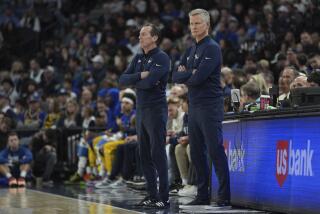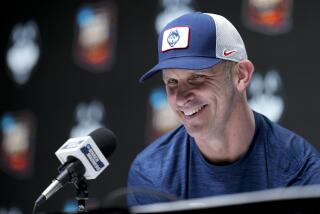COMMENTARY : Wilkens Reaches Top Nice and Quietly
Who’s now officially the best coach nobody ever heard of?
Lenny Wilkens.
*
Fame came finally to Wilkens, the only way it could have: He wore it down.
It took 22 seasons, but he collared the rascal Friday night when the Atlanta Hawks recorded a 112-90 victory over the handy Washington Bullets, giving him 939 and moving him ahead of Red Auerbach and everyone else.
Wilkens doesn’t have the best winning percentage (Pat Riley does), or the most titles (Auerbach does), and he didn’t have the most luck (Riley again). He is merely the winningest coach of all time. Let them try to take that away from him. Appropriately, the hunt for No. 939 took a week that seemed to last as long as the rest of his career.
The Hawks brought a box of baseball caps with 939 on them to Cleveland last week in case he got the record there, but they were misplaced in a mix-up at the hotel. Fortunately or not, they lost by two points to the Cavaliers.
The Hawks also brought a huge cake that cost $80 to the arena. They left it behind for the arena’s security staff.
Three nights later in Atlanta, they ordered another cake, which went for naught when the Hawks fell to the Portland Trail Blazers.
The cake and team boarded a flight to New York, where the Hawks lost again. Hawk players were allowed to eat it on the flight home before it went stale.
Cake No. 3 proved to be the charm. NBA Commissioner David Stern, who piled up frequent-flier miles following the chase, congratulated Wilkens.
Wilkens said he was just glad it was over.
In some careers, it goes like that.
*
This is a longevity record--only Wilkens, Bill Fitch and Dick Motta ever coached beyond 21 seasons; this is 23 for Motta, 22 for Wilkens and Fitch--and, appropriately, required a lifetime of struggle.
It takes a fellow lifer, like Fitch, who coached Wilkens as a player in Cleveland, to properly appreciate it.
“The one thing I always tell him,” says Fitch, currently at 850 victories but advancing deliberately, “he never had an expansion team or he’d have never made it.
“Lenny is a stubborn man so he wouldn’t let adversity knock him down. I think the closest he came to being bitter and not going on with the act was when Seattle let him go. I had a hard time convincing him to even play any more. He was going to get into some other business, get into something else, get away from all the hypocrites, all the things that go with getting a bad shake from people you’ve worked your butt off for, which he did in Seattle.”
It seemed as if Wilkens could never get over the top, internally anyway.
He grew up poor, the son of racially mixed parents in Brooklyn’s Bedford-Stuyvesant neighborhood, and even when he made it, it didn’t feel that way. He collected honors galore--he played in nine All-Star games, became a respected coach, made the Hall of Fame--but clung to the snubs, too.
Why was he passed over for the star-studded 1960 Olympic team for such (white) nobodies as Allen Kelly and Lester Lane? Why did Seattle SuperSonic owner Sam Schulman want him to give up one of his roles, player or coach, after he improved the team all three of his seasons? How did he miss coach of the year in his second stint with the SuperSonics when he took a 5-17 team to the NBA finals? How could the Cleveland Cavaliers turn their back on him because he couldn’t beat Michael Jordan--was someone else out there doing better?
If he never complained, he never forgot. His bland demeanor hid an iron will and an unrelenting drive, and his snubs were his rocket fuel.
Says a reporter who covered Wilkens, “The driving force in his life are the three words: I’ll show you.”
He generally did, too.
As a 32-year-old player-coach in Seattle, he took a two-year-old expansion team, improved it to 47-35 . . . and was told by the quixotic owner, Schulman, flushed with success after pirating Spencer Haywood from the ABA, to give up coaching and concentrate on playing.
An unhappy Wilkens then packed off to Cleveland. On his first trip back, angry Seattle fans gave him a five-minute standing ovation.
He coached the Trail Blazers but lasted only two seasons, in which newly arrived franchise Bill Walton missed 76 games.
Rehired in Seattle, he took the 5-17 SuperSonics to the NBA finals, where they led the Bullets, 3-2, before losing. NBA rules required writers to vote for coach of the year before postseason play so the award went to Hubie Brown, who had turned around a woebegone Atlanta Hawk team that bowed out in the first round of the playoffs.
A year later, the SuperSonics beat the Washington Bullets in a rematch to win the 1978-79 title. Coach of the year went to the garrulous, popular Cotton Fitzsimmons of Kansas City. The back-to-back finals between small-market teams, at a time when speculation about drug use by NBA players was rampant, almost finished off the NBA’s TV ratings.
The arrival of Magic Johnson the next season finished off the SuperSonics as title contenders. Wilkens lasted six more increasingly tense seasons. After trading Dennis Johnson, for instance, he compared the move to removing a “cancer.” After a 31-51 finish in 1985, he was booted upstairs to personnel director.
Taking over a 29-53 Cavalier team, he improved it during his first three seasons, capped by a phenomenal 43-12 start in 1988. His squad, with Larry Nance and the young Mark Price, Brad Daugherty, Ron Harper and Hot Rod Williams, was considered the team of the ‘90s but was bumped off the track in Detroit, where Rick Mahorn of the Bad Boys knocked Price woozy with an unwhistled elbow away from the play. Price was shaky afterward and Jordan gunned them down in the first round of the playoffs with his famous last-second shot--the first of four knockouts by the Bulls.
With a frosty relationship with General Manager Wayne Embry and a growing body of opinion that his calm style was wrong for the easy-going Cavaliers, Wilkens was allowed to talk to other teams in the spring of 1993. He was close to agreement with the Clippers, but their front office put it on hold for the weekend. By Monday, Atlanta had grabbed him.
Taking over a rebuilding 43-39 Hawk team, he went 57-25, despite trading leading scorer Dominique Wilkins for Danny Manning midway through the season--and finally was named coach of the year . . . before bowing out in the opening round of the playoffs.
In the glow of the record, people began saying that bad luck and bad timing had kept Wilkens from fame but that wasn’t it. It was Wilkens. In a profession made up of people guys, he was a basketball guy, pleasant but hard to know, difficult to ruffle, impossible to crack.
“You know, Lenny did this book awhile back, called ‘The Lenny Wilkens Story,’ ” his wife, Marilyn, told Sports Illustrated’s Gary Smith.
“I call it a nice bar mitzvah book. No sex in the airplanes. He doesn’t kill anybody. Nothing much happens, to tell you the truth. But wait till I write my book. Gonna be major folks running for caves because when Lenny and I started out, we were both nice and quiet people. Lenny’s still nice and quiet but after 32 years with him in this league, I’ve turned into a raving lunatic.”
Nice, quiet Wilkens has 939 and counting. That was him, too.
(BEGIN TEXT OF INFOBOX / INFOGRAPHIC)
Lenny Wilkens at a Glance
OVERALL
* Seasons: 22
* Record: 939-793
* Playoff Seasons: 12
* Playoff Record: 60-61
* Division Titles: 2
* Conference Titles: 2
* NBA championships: 1
(1978-79 with Seattle)
*
TEAM BY TEAM
* Seattle (1969-72): 121-125
* Portland (1974-76): 75-89
* Seattle (1977-85): 357-277
* Cleveland (1986-93): 316-258
* Atlanta (1993-present): 70-44
*
ALL-TIME VICTORIES
Coach: Record
Lenny Wilkens: 939-793
Red Auerbach: 938-479
Dick Motta: 870-877
Jack Ramsay: 864-783
Bill Fitch: 850-902
Don Nelson: 812-587
Cotton Fitzsimmons: 805-745
Gene Shue: 784-861
Pat Riley: 718-284
John MacLeod: 707-657
More to Read
Go beyond the scoreboard
Get the latest on L.A.'s teams in the daily Sports Report newsletter.
You may occasionally receive promotional content from the Los Angeles Times.










